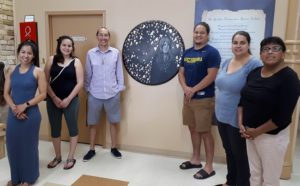Indigenous art exhibit creates awareness on MMIWG

By Colin Graf
LONDON— Hanging along the inside brick walls of Atlohsa Family Healing Services in the city’s core are a set of metallic scrolls which serve as far more than decoration, engraved with the names that bear witness to a Canadian tragedy; the names of over 70 Murdered and Missing Indigenous Women and Girls.
The “See Me” exhibit was created by a grassroots group of First Nations women from London who attend programs at Atlohsa as a means to bring attention to the MMIWG problem, says executive director Raymond Deleary. The scrolls, along with a gallery of the women’s photographs and other artwork, have been a catalyst in London for bringing attention to the problem and promoting the search for solutions.
Inspired by the artwork “Broken Circle” by Nipissing First Nation artist and London resident Sean Couchie, the group created gold birds similar to Couchie’s to represent the MMIWG on the walls of the Atlohsa meeting spaces and offices. Private sector partners in the work include the London Arts Project and Bell CTV Media.
Since the exhibit opened at Atlohsa in 2017, around 4,000 visitors have been to the building especially to view it, Deleary estimates. Many of those have been local high school students and Children’s Aid Society (CAS) workers, he says. Every single CAS worker in the region has received cultural sensitivity training. Anyone who wants to can sign up for the Atlohsa training sessions that are very similar to blanket exercises, according to Deleary, but with added local content.
Next on the list is the London Police Service. Atlohsa has just begun training the officers, and the entire police force will come through their doors, notes Deleary, adding that it is another indirect result of the community attention the art exhibit has garnered.
“The exhibit itself has just snowballed and taken on a life of its own. It has become not only an awesome social awareness campaign, but also a social enterprise revenue stream,” Deleary shares on the impacts the exhibit has had on the organization.
The exhibit has a very direct emotional impact on viewers. Deleary has noticed that visitors almost always develop feelings of empathy or sympathy, and more often than not, they leave talking about things they’ve just learned, mostly on the fact that MMIWG “is still an issue today.”
“I think the awareness piece is the most impactful. People walk away with a heightened sense of awareness about the historical colonization of Canada and the trauma it has inflicted, and also that the MMIWG are the result of colonization which is still very present,” he says.
The women named on the See Me scrolls are all from Ontario, and a quick glance shows the majority are from northern cities and First Nations. Still, the southwest area, including London, has been impacted too. There are many women who have been murdered or have disappeared in and around the city, he claims. With 10 First Nations within an hour’s drive or so, there are “countless MMIWG and boys and men who have gone missing or been murdered” in the region, according to Deleary. The scrolls are only complete up to 2013, and “many we know of in the community are not even on here,” he adds.
“Their names might not be on these murals, but the families who come here to take part in services have stories of their own family members who have gone missing or been murdered.”
The strongest emotional impact of the exhibit falls on those family members. Deleary has seen people whose pain may be triggered by their first view, but they are also thankful for the awareness the artists are bringing to the issue.
“They might feel sadness or hurt, or some form of memory, but I guess the good thing about that is Atlohsa is prepared for that. All our staff are trained in helping people overcome trauma and provide support,” he explains. “No one has ever asked for photos to be removed or names taken off the scrolls.”
The exhibit has also helped in the movement to combat human trafficking along the Highway 401 corridor in southern Ontario. Last May, dozens of First Nations women took to the street outside of the office to stage a drumming and singing protest over the lack of voice for women who have been trafficked.
Atlohsa is also gearing up to present the group’s second set of Peace Medals next fall. The seven medals, which mirror the Seven Grandfather Teachings, will be presented to individuals or groups from across Ontario that exemplify the teachings in the spirit of reconciliation.

